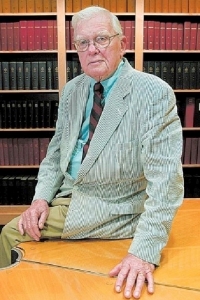Brendan Padraic Pearse Phibbs, MD, FACP, FACC, medical pioneer and Bronze Star double recipient in World War II, died at age 99 on March 5 in Tucson.
 In 1971, Dr. Phibbs moved to Tucson to join the Section of Cardiology at the then-new University Arizona College of Medicine. He later became chief of cardiology at Pima County Hospital in 1975 and helped establish Kino Community Hospital. During his medical career in Tucson, he taught and mentored medical students, wrote cardiology texts, and advocated for quality universal health care.
In 1971, Dr. Phibbs moved to Tucson to join the Section of Cardiology at the then-new University Arizona College of Medicine. He later became chief of cardiology at Pima County Hospital in 1975 and helped establish Kino Community Hospital. During his medical career in Tucson, he taught and mentored medical students, wrote cardiology texts, and advocated for quality universal health care.
He established Tucson’s first mobile cardiac care unit, equipped with an electrocardiograph, battery-operated defibrillator and a two-way radio to hospitals. He also developed a throat-culture screening program for strep for the Tohono O’odham community in Sells, where rheumatic heart disease was the leading cause of death at the time.
Dr. Phibbs had established a similar program during the 1950s in Wyoming, where he moved with his family in 1952. There he practiced internal medicine for 20 years in Casper, specializing in cardiology. Besides setting up a local health fund to support the strep-screening program he created to prevent rheumatic heart disease, he led a crusade against silicosis and lung cancer among miners in bentonite and uranium mines in Wyoming, resulting in industry-wide health standards to protect miners.
Born Dec. 3, 1916, in New York City, he grew up in Chicago. He married Marie Claire (Penny) Harle in June 1940, and earned his medical degree from Northwestern University in 1941. He served as a combat surgeon in the 12th Armored Division of the United States Army from 1942-1945, fighting through the Battle of the Bulge. A major, he was one of the first American physicians to volunteer in the typhus-ravaged Dachau concentration camp. After the war, he completed his residency in internal medicine at Presbyterian-Saint Luke’s Hospital in Chicago and earned a Master of Science degree in physiology.
Penny Phibbs, his wife of 34 years, died in Tucson in 1975, mourned by friends in both Casper and Tucson. Dr. Phibbs married Liana Fernandez de Castro in 1982. They shared their passions for literature, art and the out of doors until her death in 2011.
Dr. Phibbs wrote a memoir of his WW II experiences, “The Other Side of Time,” published in 1987, and awarded the PEN West Award for Nonfiction. Dr. Phibbs was an active member of the ACLU, served on the National Board of the Audubon Society, volunteered with Tucson’s Holocaust Education Committee, travelled to Navajo and Tohono O’odham American Indian communities to hold free cardiology clinics.
Dr. Phibbs is survived by his brother Roderic Phibbs, MD (Jane) and their four sons, and by his children Susan Breznay (George), Henry Phibbs (Leslie Pedersen), Judith Phibbs, Hugh Phibbs (Joan Warburton), seven grandchildren and two spouses, two grandsons-in-law, two step-nieces and two step-nephews and their families, and two great grandchildren.
In lieu of flowers, the family's goal is to create an endowment which will improve heart health and suggests donations be made to the University of Arizona Sarver Heart Center in memory of Brendan P. Phibbs, MD. Online donations can be made here. (Please select “other” under designation.) Checks payable to UAF/Sarver may be sent to:
UAHS
PO Box 245018
Tucson, AZ 85724
Link to Video of Dr. Phibbs' Memorial Service
Comments from UA Sarver Heart Center Leaders
“On the few occasions I met Dr. Phibbs, it was clear he was an accomplished and inspirational man, and a great cardiologist. This is truly a loss to the Sarver Heart Center and the Tucson community,” said Nancy K. Sweitzer, MD, PhD, professor of medicine, chief of cardiology, director, University of Arizona Sarver Heart Center.
“Brendan was one of the most interesting and accomplished individuals that I have met. A hero in World War II, and pioneer in several areas of cardiology, including the development of a system to prevent rheumatic fever and thus rheumatic heart disease, and one of the first to advocate treadmill testing before hospital discharge of all patients with a heart attack. He was the best teacher of electrocardiography, and had a collection of almost every arrhythmia known. He was a personal friend. One of the highlights of Priscilla (Ewy) and my experiences was taking him back to Europe to visit areas where he had fought in World War II. He was a true renaissance man,” said Gordon A. Ewy, MD, professor emeritus and director emeritus, UA Sarver Heart Center.

